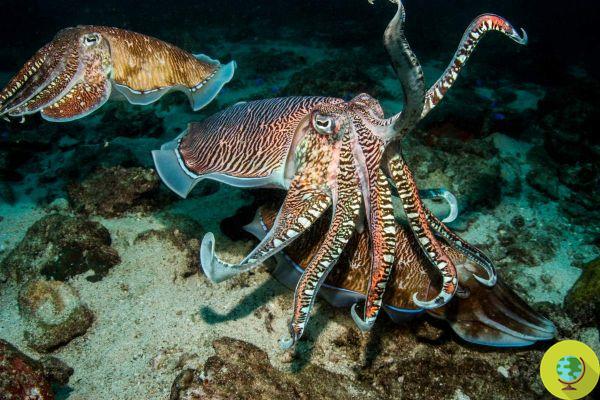
A new study from the University of Cambridge found that the cuttlefish passed a cognitive test designed for children
We are not the only intelligent beings on this planet, quite the opposite. If compared to other species we have unique characteristics, some animals are also endowed with surprising abilities. A new study conducted at the University of Cambridge found that the Cuttlefish have passed a cognitive test designed for children.
The study, published today in the journal Proceedings of the Royal Society B, provided the first evidence of a link between self-control and intelligence in a non-primate species.
What have cuttlefish done so special? They snubbed cheap "snacks", preferring to wait and get a snack more to their liking.
The marshmallow test
It is the so-called "marshmallow test" according to which those who wait and delay gratification longer are more intelligent. To demonstrate this, two foods that they commonly eat were presented separately to the common cuttlefish (Sepia officinalis). Some were given pieces of prawn which they could eat immediately, others a live prawn, their favorite food, which they could only eat if they waited.
The timing of administration was then examined starting at 10 seconds and increasing by 10 each time. All six cuttlefish involved in the test showed self-control, waiting for the shrimp and ignoring the shrimp. Those with the most self-control were able to wait up to 130 seconds for shrimp, a skill comparable to animals with large brains like chimpanzees.
“It was quite surprising that the cuttlefish could wait more than two minutes for a better snack. Why should a fast-growing animal with an average lifespan of less than two years be picky? Said Dr Alexandra Schnell of the Department of Psychology at the University of Cambridge, first author of the paper.
The learning ability of each cuttlefish was then tested in a different task. One dark gray and one white marker were placed in random positions. After learning how to associate a color with a reward, the reward was changed to be associated with the other color. The cuttlefish who were fastest to learn the association and fastest to make the switch were the same ones who showed more self-control in the first task.
“We found that cuttlefish with better learning performance - an indicator of intelligence - also exhibited better self-control. This link exists in humans and chimpanzees, but this is the first time it has been shown in a non-primate species, ”Schnell said.
Researchers suggest that self-control in cuttlefish is the byproduct of another behavior: they are capable of staying camouflaged at the bottom of the sea for long periods of time to avoid predators.
"The ability to exercise self-control is an important element of planning for the future, which is quite sophisticated behavior," said Professor Nicola Clayton of the Cambridge Department of Psychology, senior author of the report. "Self-control requires an awareness that 'sometimes less is more' and that avoiding temptation now could lead to better results in the future."
Among animals, monkeys and their intelligent feathered cousins, corvids and parrots, have relatively high self-control when it comes to eating. It is much more difficult for rats, chickens and pigeons not to eat the food right away.
Yet another demonstration of the fact that animals are smarter than we imagine.
Sources of reference: University of Cambridge, Proceedings of the Royal Society B
READ also:
- In the depths of the ocean, the largest city of octopuses ever seen before has been discovered
- Beyond Inky's Great Escape: 5 Surprising (and Clever) Octopus Behaviors (VIDEO)
- Animals are smarter than we think (VIDEO)


























